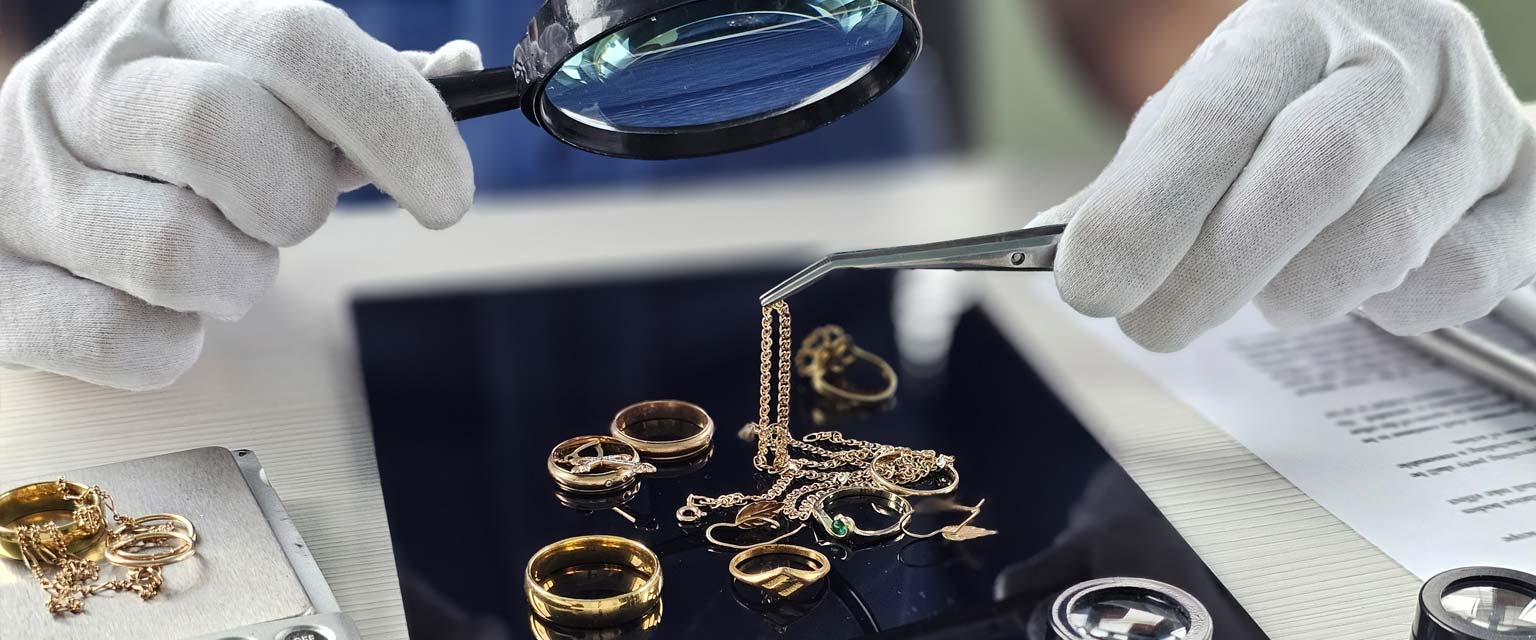If you’re considering selling your jewelry, understanding jewelry appraisal is an essential first step. A proper appraisal provides a clear picture of your items’ worth, ensuring you get top dollar when selling. Without an accurate appraisal, many sellers risk undervaluing their gold, silver, platinum, or gemstone pieces, potentially losing hundreds or even thousands of dollars.
A professional appraisal also builds trust with buyers, giving them confidence that your jewelry’s value is verified by a credible source. Whether you are selling a vintage engagement ring, a gold bracelet, or a rare collectible, knowing its value beforehand can make the selling process smoother and more profitable.
At CV Coins & Collectables, we have been helping San Diego residents navigate the jewelry selling process for over 50 years. Our team of experts provides honest, transparent, and reliable jewelry appraisal services, so you can sell your items confidently and receive fair market value for every piece.
What Is a Jewelry Appraisal?
A jewelry appraisal is a professional evaluation of a piece of jewelry to determine its current market value. Appraisals provide sellers and buyers with a written, detailed report that includes the type of metal, gemstones, craftsmanship, and overall quality. This report is crucial whether you’re selling your items, insuring them, or simply curious about their worth.
One key concept to understand is the difference between retail replacement value and resale value. Retail replacement value reflects how much it would cost to replace the item at a jewelry store. In contrast, resale value is what a seller might realistically receive when selling the item, which is often lower but can still be maximized with a proper appraisal.
Professional appraisers are typically licensed gemologists or accredited jewelry specialists who follow established industry standards. They evaluate the item using precise measurements, gem testing, and comparison to current market conditions. Appraisals can be performed on a wide variety of items, including:
- Gold jewelry: Rings, necklaces, bracelets, and coins
- Silver pieces: Flatware, collectible coins, and sterling jewelry
- Platinum items: High-end engagement rings, cufflinks, and watches
- Gemstones: Diamonds, sapphires, emeralds, rubies, and other precious stones
By having your jewelry professionally appraised, you gain a clear, verified understanding of its value, which is essential when negotiating a sale or ensuring fair compensation.
Types of Jewelry Appraisals
There are several types of jewelry appraisals, each serving a unique purpose:
- Insurance Appraisal: Determines the cost to replace an item in case of loss, theft, or damage.
- Resale Appraisal: Focuses on the amount a seller could reasonably receive if selling to a dealer or buyer.
- Estate Appraisal: Evaluates jewelry for estate planning, inheritance, or legal purposes.
Knowing which type of appraisal you need is crucial before selling, as it ensures your piece is valued accurately and aligns with your goal, whether it’s maximizing resale value or securing coverage.
Why Jewelry Appraisals Are Important Before Selling
Before parting with your jewelry, getting an accurate jewelry appraisal value is critical. An appraisal helps you understand the true worth of your gold, silver, platinum, or gemstone pieces so you don’t accept less than they’re worth. Without this step, many sellers unknowingly accept low offers simply because they lack documentation or expert insight into their item’s value.
Appraisals also serve as a protective tool. In today’s online marketplace, countless dealers and websites purchase jewelry, but not all are transparent about pricing. Having an appraisal ensures you know the baseline value and can confidently negotiate fair offers.
A professional selling jewelry appraisal also builds trust. When a buyer sees that your jewelry has been appraised by a credible expert, they are more willing to pay a fair price, knowing the item’s quality and authenticity have been verified.
Avoiding Scams and Low Offers
The rise of online marketplaces has made jewelry selling easier but riskier. Many unverified buyers offer quick cash for gold or diamonds, but drastically undervalue items. A professional appraisal acts as a safeguard, protecting you from dishonest practices and “cash for gold” scams. By knowing the true value, you can quickly spot unfair offers and walk away with confidence.
Establishing Trust With Buyers
An appraisal doesn’t just help you, it reassures potential buyers too. When you can provide an appraisal certificate, it shows the item has been professionally evaluated. This eliminates doubts about authenticity and makes negotiations smoother and faster. Buyers are more willing to meet your asking price when they know they’re purchasing a verified piece.
How Is a Jewelry Appraisal Done?
The jewelry appraisal process is more thorough than many people realize. A qualified appraiser carefully evaluates the item, documents its characteristics, and determines its value based on current market conditions. Here’s how it typically works:
- Inspection of the item: The appraiser examines the jewelry’s overall condition, including wear, damage, or repairs.
- Testing the metal: Tools are used to determine whether the piece is gold, silver, platinum, or another metal, along with its purity (e.g., 14K, 18K).
- Gemstone evaluation: Diamonds and colored gemstones are tested for authenticity, carat weight, clarity, cut, and color.
- Market research: The appraiser compares the item with similar pieces on the market to estimate resale value.
- Written report: You’ll receive a detailed document outlining the findings, including descriptions, photographs, and the appraised value.
Appraisers often use specialized tools like a jeweler’s loupe, digital scales, and gem testers to ensure accuracy. Every step is designed to give you a reliable assessment of your item’s worth so you can sell with confidence.
What Appraisers Look For
When appraising jewelry, experts focus on several key factors:
- Metal purity: The karat of gold (10K, 14K, 18K, etc.), silver fineness, or platinum content significantly impacts value.
- Gemstone quality: Cut, clarity, color, and carat weight determine the worth of diamonds and colored stones.
- Craftsmanship and design: Brand names, designer marks, and overall artistry add to resale value.
- Condition: Scratches, loose stones, or missing parts can lower the appraisal value.
By considering all of these details, an appraiser provides a comprehensive picture of your item’s true market value — not just its appearance or weight.
Jewelry Appraisal Tips Before Selling
Before you schedule an appraisal, a little preparation can make the process smoother and even improve the accuracy of your valuation. Here are some practical tips for jewelry appraisal:
- Clean your jewelry: Dust, dirt, or buildup can obscure details, especially in gemstones. A clean piece is easier to evaluate.
- Gather paperwork: Bring along any receipts, certificates, or prior appraisals. Documentation adds credibility and can help confirm details like gemstone origin or brand authenticity.
- Verify credentials: Choose an appraiser with recognized certifications. A qualified gemologist or licensed appraiser ensures accuracy and professionalism.
- Know what you need: Request a resale appraisal (not just an insurance value) if you plan to sell. Insurance appraisals usually reflect inflated replacement costs, not what buyers will actually pay.
- Choose trusted services: Not all appraisals are equal. Look for transparency in pricing, clear written reports, and positive customer reviews.
Preparing in advance ensures you get a fair and accurate valuation, helping you make informed decisions when it’s time to sell.
Questions to Ask Your Appraiser
Don’t be afraid to ask questions during the appraisal process. Some important ones include:
- What type of appraisal is this—insurance, estate, or resale?
- Does this report include the current resale market value?
- Will I receive a written certificate or official report?
Clear answers to these questions give you confidence in the appraisal and help you avoid confusion later when negotiating offers.
Selling Jewelry After an Appraisal
Once you’ve completed your appraisal, the next step is figuring out how to get the most from your item. A jewelry appraisal value provides you with leverage and confidence, you know what your piece is worth, and you can use that information to avoid lowball offers.
The process is straightforward:
- Schedule a selling appointment with a trusted buyer.
- Present your appraisal report and jewelry for review.
- Receive a quote based on the verified value of your piece.
- Get paid quickly once the offer is accepted.
Selling to an experienced buyer, such as CV Coins & Collectables, ensures that the appraisal is respected and the offer reflects true market value. Unlike many online platforms, where sellers face risks of scams or delayed payments, a local, reputable buyer provides security, transparency, and immediate payout.
Negotiating Offers Based on Your Appraisal
Your appraisal is your strongest bargaining tool. It shows potential buyers you’ve done your homework. While it’s important to use the appraisal value to avoid underpricing, keep in mind that market demand, condition, and resale margins all play a role. The best strategy is to negotiate confidently but realistically, ensuring you still walk away with a fair deal.
Selling Online vs. Selling In-Store
While online platforms may seem convenient, they come with risks such as counterfeit scams, delayed payments, or hidden fees. Selling locally through a trusted buyer offers a safer and faster option. You can meet face-to-face, present your appraisal, and walk away with immediate payment, no waiting weeks for a transfer or dealing with unreliable buyers. For peace of mind and maximum payout, in-store selling is the smarter choice.
Frequently Asked Questions About Jewelry Appraisals
Sellers often have many questions before their first appraisal. Here are some of the most common:
Most appraisals can be completed in 30–60 minutes per item, depending on complexity.
Yes. Because market prices fluctuate, an appraisal is typically considered accurate for 2–3 years. After that, an update is recommended.
In most cases, yes. A written appraisal serves as an independent valuation you can present to potential buyers. However, not every buyer will pay exactly that value, offers vary depending on market demand.
An appraisal is a formal written report prepared by a professional, often used for insurance, estate, or resale. A valuation may be a less formal estimate of worth, often used by jewelers or dealers.
Not always. For simple gold or silver items, the value can often be determined by weight and purity. But for diamonds, designer pieces, or estate jewelry, a professional appraisal is strongly recommended.
These jewelry appraisal FAQs help sellers make confident, informed decisions.
Final Thoughts: Jewelry Appraisal and Selling With Confidence
Getting a jewelry appraisal before selling isn’t just a smart step, it’s the key to selling with confidence. A professional appraisal helps you understand the true value of your items, avoid scams, and negotiate from a position of strength.
At CV Coins & Collectables, we’ve built our reputation on trust, transparency, and top payouts. With over 50 years of expertise, we make the selling process easy and secure, offering free appraisals for sellers and immediate, fair offers based on today’s market.Don’t leave money on the table. Schedule your jewelry appraisal today with CV Coins & Collectables and get top dollar for your jewelry.



